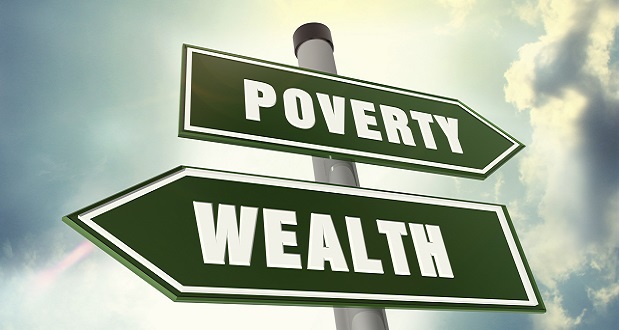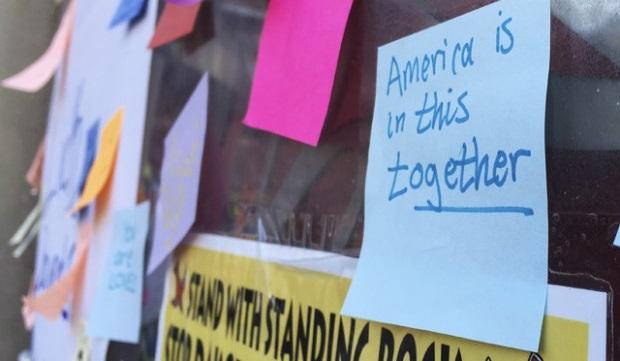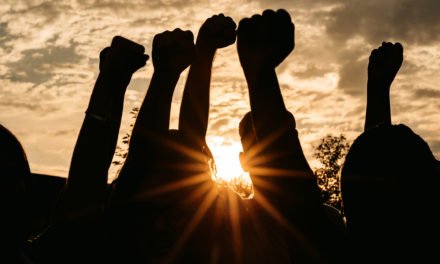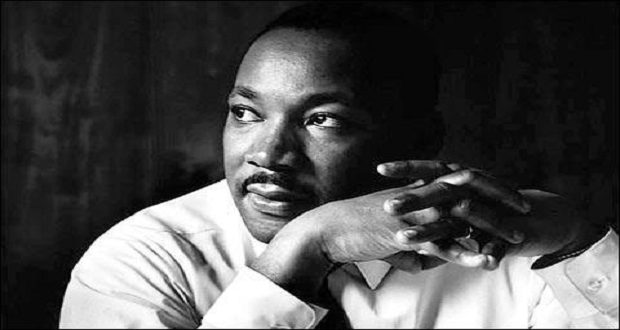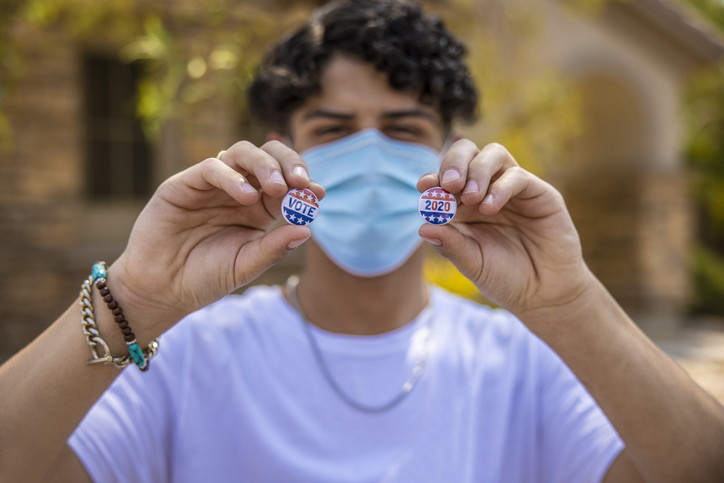
Like many of you, I went through school reciting the Pledge of Allegiance, even memorized the Preamble of the United States Constitution for extra credit. I adored, and still adore, School House Rock videos on the electoral college, and “suffrin’ for suffrage,” and popular sovereignty. Our Democracy is special and unique, and the core tenet of voting always made me feel like I was part of our country’s fabric. That I was part of the “We” in the “We The People” mentioned in the start of the preamble. That everyone was part of the “all” afforded liberty and justice as espoused in our pledge.
I realize now that the reality of those words I memorized, the messages I repeated, the beliefs I had about our democracy, came with disappointing disclaimers:
Is it “We The People of the United States,”
Or
We the (white, wealthy, and worthy) People of the United States?
Is it 'We The People of the United States,' Or 'We the (white, wealthy, and worthy) People of the United States?' Share on XIs it “With Liberty and Justice for All,”
Or
With Liberty and Justice for All (who have a car, can get off work, who have a permanent address, have time to wait in a line if need be during work hours, have an ID that matches their current residence, access to a birth certificate and social security card)?
Who gets to decide who is more worthy of a right that is inherently their own? Why is this even a question?
The power to vote as an American citizen is one of the core tenets of our democracy. Yet, this so-called “right” has been morphed into a privilege upheld to silence, and not just “suppress,” but oppress, Black, Indigenous, People of Color, low-income earners, and younger citizens. This isn’t new. Voter suppression or oppression is a systematic and calculated tactic sustained by fearmongering, gerrymandering, misinformation, and criminalization. The reason? Political gain by and for white people in power who are “afraid” of the changing demographics of America.
The power to vote — this so-called “right” has been morphed into a privilege upheld to silence, and not just “suppress,” but oppress, Black, Indigenous, People of Color, low-income earners, and younger citizens. Share on XSo, what do I mean when I say voters are being oppressed? Abundant non-partisan research shows that voter suppression has been intentional and systematic. Next week, we’ll be hosting a screening of the documentary Rigged, which outlines the voter suppression “playbook,” a series of calculated political tactics used to suppress votes of the growing population of Black, Latinx, Asian, Pacific Islander, and Indigenous communities over the past decade. The “playbook” includes everything from “cracking” densely populated ethnic enclaves into different state districts to minimize the BIPOC and/or urban vote, to conservative legislators pushing voter rights “reform” (i.e. removing eligible voters who have been recently inactive in civic engagement or requiring specific identification materials to even register).
The “playbook” ultimately undermines and disrupts our strides toward a democracy for all. The final “play” seeks to ultimately create a cultural attitude and perpetuate ideological perspectives that exclude, criminalize, and dehumanize citizens of color. This is accomplished by fueling rhetoric that “those people” don’t vote because they are “lazy,” “uninterested” or “un-American,” all in the name of voter “fraud,” the unfounded idea that people are voting illegally and manipulating “the system.” It is worth noting that only 17 instances of fraud have been proven by the government in 20 years. Quite frankly, “those voters” aren’t manipulating the system. The system is manipulating us.
What can we do within our sphere of influence to ensure that everyone who has a right to vote is able to vote? As we gear up for the 2020 Presidential Election, there is no better time to start using our collective power to ensure our communities do not fall victim to voter oppression.
As we gear up for the 2020 Presidential Election, there is no better time to start using our collective power to ensure our communities do not fall victim to voter oppression. Share on X- If you are an organizational leader, make Election Day a paid day off. Many organizations, small and large, have come out to make this swift but impactful change. One of the main reasons people can’t vote in-person is often time due to their work requirements. A day off affirms your commitment to your employees beyond the workplace and your support of their inherent right to contribute to our democracy.
- If you are able, willing, and have the day off: volunteer to be a poll worker. This is especially important this year as many poll workers are usually elderly and/or retired and working at the polls could increase their risk and exposure to COVID-19. Thus, many locations are in dire need of workers. Find out how to sign up at your local election office or here.
- If you want to influence local change, inform and support redistricting reform in 2021 within your state. Fighting voter oppression goes beyond just election day. In fact, local-level political reform and legislation has been tremendously impactful in disrupting gerrymandering and creating equitable political districts. Come 2021, various state redistricting campaigns will be in full swing. Find your local or state campaign and learn about the redistricting reform specific to your community here. Petition, advocate, and find partnerships with local organizations to push reform for equity and justice.
- If you have a car: Volunteer to offer transportation to the polls. Many organizations across the country such as Motivate Bikes and Lyft are offering free transportation options for election day. Offering a ride on election day to someone who needs it makes a big difference, or volunteering to be a poll driver for one of these organizations, can make a huge difference.
- If you are a social media maven, use your platforms to educate your community on your voter ID requirements. Spread the Vote is a great resource for learning about state-specific voter ID requirements. Every state is different, and many involve multiple steps that need to be taken just to get registered. Keep your communities aware with a civic engagement resource share.
- If you are looking to invest in your community, donate to voter suppression activism groups. Effective grassroots efforts involve people, power, and financial sustainability. Learn how you can commit to sustainable investments in your community by donating your time and/or money to these organizations fighting voter suppression by removing barriers.
- Lastly, if you want to make a difference, change the narrative, one conversation at a time. We must take an active stance to challenge narratives that we see perpetuated in conversations with friends, families, and colleagues. Use your voice to disrupt the myth that BIPOC citizens, citizens with disabilities, citizens without stable housing, are lazy, unintelligent, or “unfit” to express their right to contribute to our society.
“We” in “We the People” might look different than it did in 1776, but that’s what makes our country strong. When we say liberty and justice for all, let’s live up to our word and make it mean all of us. I hope one day we can say these words with dignity, sans these disclaimers destroy our democracy, so generations to come can vote with the liberation, not oppression.

